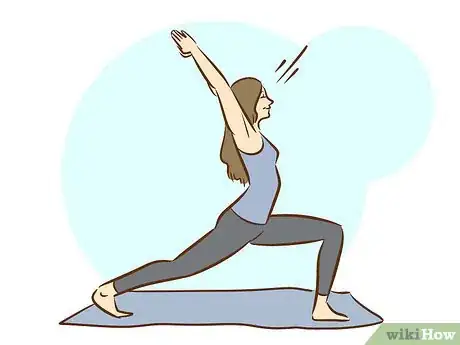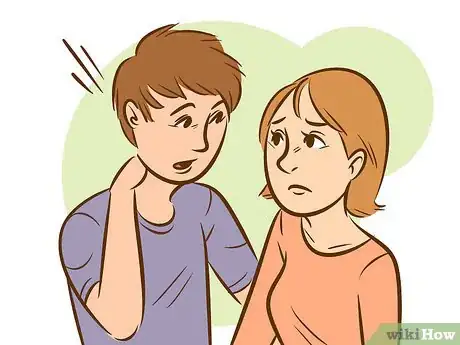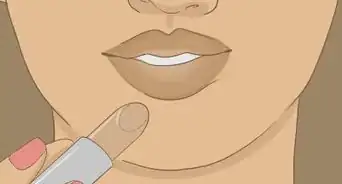This article was co-authored by Julia Yacoob, PhD. Dr. Julia Yacoob is a Licensed Clinical Psychologist practicing in New York City. She specializes in Cognitive Behavioral Therapy (CBT) for adults coping with a variety of symptoms and life stressors. Dr. Yacoob earned an MS and Ph.D. in Clinical Psychology from Rutgers University, and pursued specialized training at Weill Cornell Medical College, New York Presbyterian Hospital, Memorial Sloan-Kettering Cancer Center, the Institute for Behavior Therapy, and Bellevue Hospital Cancer Center. Dr. Yacoob is a member of the American Psychological Association, Women’s Mental Health Consortium, NYC Cognitive Behavioral Therapy Association, and Association for Cognitive and Behavioral Therapies.
There are 49 references cited in this article, which can be found at the bottom of the page.
This article has been viewed 160,139 times.
Most of us wonder about our appearance from time to time. Unfortunately, society puts a lot of emphasis on the idea of “beauty.” TV and movies, magazines and books, and thousands of products and ads all insist that there’s one “ideal” you have to meet to be “beautiful.” These unrealistic and exclusionary standards take root in our minds early. Research studies have found that 50% of girls between the ages of 3 and 6 worry that they’re “fat” and nearly a third would alter their physical appearance if they could. However, several research studies have also shown that “beauty” is highly subjective and personal. It truly is in the eye of the beholder.[1] There is no one way to be beautiful. Learning to accept yourself and be confident in who you are, inside and out, will help you feel beautiful every day. And research has shown that when you feel beautiful, others are likely to feel that way too![2]
Steps
Learning to Accept Yourself
-
1Show yourself compassion.[3] Our appearances can be the source of a lot of shame and emotional pain. Sometimes, this shame can keep you from seeing your true beauty because you are stuck in a cycle of feeling unworthy, unlovable, undeserving, or inadequate.[4] If others have judged you according to society’s artificial standards, you may also feel humiliated or embarrassed.[5] Showing yourself compassion is the antidote to the shame that comes from being judged by others (or judging yourself).[6] Here are some exercises you can do to begin building your self-compassion:[7]
- Think of a shameful experience or old wound from your past. Imagine what you wish someone would have said to you in that moment. What words do you wish you had heard? Write down those words.
- Next, imagine that the words on the paper are being spoken to you by someone you love, admire, or cherish. This could be a dear friend, or even a spiritual figure. Hear this person saying the words, and allow them to sink in. Notice the emotions you experience when hearing these words. What do you feel?
- Practice saying these words or phrases out loud to yourself. Focus on your breathing and let the words sink in as you breathe deeply. Notice your emotions as you hear yourself say these words.
-
2Think about how you would treat a friend.[8] Sometimes, we are much harsher on ourselves than we would ever be to anyone else. Think about how you would speak with a friend who was struggling to feel beautiful. What would you say to him or her? Try extending this same kindness to yourself.[9]
- Imagine that your friend came to you and expressed that s/he was feeling bad about his or her looks. What would you say? How would you respond? Write these down.
- Think about the criticisms or feelings you have about your own beauty. How do you respond to yourself in these situations? Write these down.
- Compare the two. Is there a difference? If yes, why do you think that is? What motivates your responses to others? What motivates your responses to yourself?
- Write down a few ways that you can change your responses to your own struggles to be more kind and understanding.
- Research suggests that people tend to choose friends that they see as attractive in some way.[10] Think about what you find beautiful in the people you love. You may find that your standard of beauty for your friends is far more inclusive than the standard you hold yourself to.
Advertisement -
3Challenge self-criticism. Research has shown that self-criticism can cause anxiety and depression.[11] You may feel unhappy with yourself because you compare yourself to society’s artificial standards, or because you have been judged by others and feel ashamed. The more you practice on challenging unhelpful or self-critical thoughts, the more you will feel comfortable accepting yourself just as you are.[12]
- The human brain has a bad tendency to focus on negative experiences and information, allowing the positive things to slip by us.[13] The next time your inner critic tells you that you aren’t “______ enough,” remember that your brain doesn’t always tell the truth. It has probably overlooked many positive things about you to latch onto something negative, which may not even be true.[14]
- For example, you might experience a critical thought such as “I give up. I will never be any thinner than I am. It’s useless to even try.”
- There are several ways to handle this type of thought. For example, you could examine why you feel the need to become thinner. Is it for health reasons that you and your doctor have agreed on? Or because you are comparing yourself to someone else’s standard of beauty? Remember that no one else can tell you how you “ought” to look.
- You could also look for positives about yourself to challenge these negative thoughts. For example: “I will never give up on myself. I may not get any thinner, but I will work out so that I can stay strong and play the sports I enjoy.”
- You can also set new goals for yourself that show yourself kindness and acceptance. For example: “I don’t like going to the gym, but I do enjoy going for walks in my neighborhood. I don’t need to work out the way society says I should. I will do what makes me happy.”
-
4Practice mindful awareness of your thoughts.[15] A helpful way to deal with self-judging thoughts is to remember that they are just thoughts. They are not necessarily “true.” Trying to fight negative thoughts doesn’t always work. In fact, you may find yourself obsessing over the negative thought in trying to “get rid of it.” You may even find yourself judging yourself for not being able to stop thinking these thoughts. Instead, try acknowledging that these thoughts have occurred, and then acknowledge that these thoughts are not facts.[16]
- For example: “I am experiencing the thought now that I am not beautiful. This is just a thought. It is not a fact. I cannot control these thoughts, but I do not have to believe them.”
- Practicing meditation can also help you become more mindful of your thoughts. You can learn to accept them in the moment without judgement. Mindfulness meditation and loving-kindness meditation are good types to get you started. Studies have shown that meditation can actually rewire how your brain responds to stressors.[17]
-
5Focus on the positives. Being surrounded by stereotypes of beauty can leave you vulnerable to the cognitive distortion of “filtering,” where you end up focusing only on the things you don’t like about yourself. Challenge this distortion in your thinking by making a game of it: every time you think of something negative about yourself, immediately find something positive to counter it. It can be helpful to say these positive things into a mirror, which can help you accept what you’re saying as true.
- For example, if you experience the thought, “Ugh, my teeth are so crooked,” stop and find something positive: “I have a beautiful smile that can show when I’m happy and encourage others.”
- Sometimes, the guilt and judgment we face from the world can make it hard for us to find anything beautiful about ourselves. If this is the case for you, try starting by focusing on the incredible things your body can do. Do you play sports, lift weights, dance, run, laugh, breathe? Can you hug someone, sing a song, cook a meal? Appreciating your body for what it can do for you can help make it easier to find things you like about it.[18]
-
6Make a self-appreciation list. Since our brains do such a good job of focusing on the negative, actively counter that tendency by keeping a list of the positive things about yourself. Taking time to acknowledge and record things that you like about yourself will help “store” them in your brain so that you can remember them later. When you are going through a tough patch, take out your self-appreciation list and reflect on the many things that make you your beautiful self. Here are some questions to get you started:
- What do you enjoy about yourself and your life?
- What skills or abilities do you value?
- What do others compliment you on?
- What do you love about how you look today?
- What is one success you had today?
- What do you find beautiful about today?
- What is one aspect of yourself that you are proud of?
- What do you find beautiful about how you impact others?
-
7Write yourself a forgiveness letter. Learning to forgive yourself is critical in helping you heal from past wounds that may be keeping you from seeing your true worth. Maybe you made a mistake in your past that you still judge yourself for. Maybe you feel guilty over an experience your younger self had. Whatever it is, forgiving yourself for the past can help you move forward.[19] [20]
- Identify an experience that makes you feel guilty or sad. Address your letter to your younger self about this experience.
- Use kind, loving words in your letter. Speak to yourself as you would speak to a friend or loved one who is struggling with guilt.
- Remind your younger self that mistakes are opportunities to learn, not things that forever ruin your life.
- Make a plan for how you will use this past experience to grow in the future.
Developing Your Self-Confidence
-
1Question standards of beauty. Because we’re bombarded with images of what beauty is “supposed” to mean every day, it can be easy to accept those stereotypical definitions as true. Remember that these definitions are narrow, artificial, and exclusionary: all too often, “beautiful” means tall, white, thin, and young.[21] You don’t have to accept anyone else’s standards. Learning to recognize how artificial and unrealistic these external standards are can help you recognize that you are beautiful no matter what anyone else says.
- The beauty standards promoted by the media we consume have very real effects on us. Studies have shown that exposure to unrealistic depictions of bodies lead to increased depressive symptoms and dissatisfaction with one’s appearance.[22] [23]
- Do an internet search for “magazine Photoshop failures” or “model airbrushing” to see just how many of these beauty ideals are entirely manufactured. Even supermodels cannot conform to these beauty standards without alteration.[24]
-
2Keep a journal. Journaling can help you identify unhelpful patterns of thinking. Remember that stress and anxiety can affect how you see and experience yourself, so you may experience more negative thoughts when you’re stressed or anxious. Write down when you struggle with negative thoughts or feelings about your appearance. Be as specific as possible. Here are some questions to help you:[25]
- What was the thought or feeling you had?
- What were you doing or focused on when you had this thought or feeling?
- What happened just before and just after this thought or feeling?
- Why do you think you had this thought or feeling?
- How do you think you can respond to this thought or feeling differently in the future?
-
3Practice active gratitude. Gratitude is more than a feeling, it is a habit. Research has shown that people who routinely practice gratitude in their daily lives are happier and more optimistic than people who don’t. Focus on the positive things in your life to help build your confidence.
- Acknowledge and reflect on positive moments. It’s easy for your brain to ignore positive information because it’s always hunting for the negative stuff. The next time a friend gives you a compliment or you find yourself feeling great about yourself, take a moment to stop and savor that experience.[26]
- Focus on how you feel when you notice these positive moments. What senses are you using? How does your body feel? What are you thinking? Reflecting on these aspects can help you remember the positive moment more strongly later.[27]
-
4Dress for success. It’s all too common for people to feel insecure, even ashamed, of their bodies. You may find yourself dressing a certain way to hide areas that embarrass you, or because you feel you do not “deserve” to dress a certain way. You may be tempted to wait until you have your “ideal” body before you buy attractive clothes. These actions will damage your self-confidence. Buy clothes that fit your body, just as it is. Wear clothes that make you feel beautiful, regardless of what any external standard says.[28]
- Research has shown that what you wear can impact your confidence. For example, one study found that people who wore a lab coat while performing a simple scientific task were more confident and had better results than those who didn’t wear a coat -- even though it was the exact same task![29] If you feel attractive and confident in your clothes, others will pick up on that too.
- How you dress impacts how you feel about yourself. For example, actors often say that their costumes help them discover their characters. Dress for the “character” you want to be.[30]
- Find clothes that fit your body properly. Studies have demonstrated that when people wear clothes that fit well, others were more likely to see them as attractive.[31]
- Wear what makes you happy. If you love doing up your makeup, go for it! If you feel happiest when you’re wearing your comfy sweatpants, do it!
-
5Take care of your body. Your body does not have to conform to anyone else’s standards. Consider your motivation for how you eat and take care of yourself. Try to avoid doing things because you feel you “ought to” to meet society’s standards. Eating well, exercising, and developing good habits can help you feel beautiful by reminding you that you are honoring yourself because you are worth caring for.[32]
- Exercise. Exercising releases natural mood-boosting chemicals called endorphins.[33] Regular moderate exercise -- whether it’s running, swimming, or even gardening -- can also make you feel more energetic and positive.[34] Just don’t approach it with the idea of “fixing” yourself, or you could actually cause yourself more mental hurt than good.[35] Remind yourself that you are taking care of your health because you love yourself.
- Eat well. How you eat can actually affect your mood.[36] Make sure to incorporate plenty of fresh vegetables, fruits, whole grains, and lean proteins into your diet. If you notice that you don’t feel good about yourself after eating something, consider why. You may want to avoid that food, or you may want to teach yourself new ways of responding to it. And remember: everything in moderation, including moderation. If you’re really craving a slice of peach pie, it’s okay to treat yourself.
- Pamper yourself. Take a hot bath, go for a manicure, get a massage. Appreciate that you are worth treating well.[37]
- Get enough sleep. When you don’t sleep well, you can end up experiencing symptoms including anxiety, depression, obesity, and irritability.[38] Make sure to take time to get the sleep your body needs.
Practicing with Other People
-
1Surround yourself with caring people. Humans are highly susceptible to “emotional contagion,” which happens when we pick up on the emotions of those around us and begin to feel the same way.[39] [40] In other words, you’re likely to feel the same way that the people around you feel. Researchers have found that support, compassion, and kindness from others impacts our brains and sense of well-being.[41] Surround yourself with friends and loved ones who support each other and don’t judge others based on shallow and artificial ideas.
-
2Tell others when your feelings are hurt. Some people may make hurtful comments about your appearance without even realizing that they have been unkind. Others may say hurtful things because of their own insecurities. Stand up for yourself when these things happen. Calmly tell the other person how s/he has hurt your feelings and ask him/her to stop. If s/he does not, avoid that person. You don’t have to put up with judgment or unkindness from others.[44]
- Bullying about one’s appearance is unfortunately common. If you are the victim of bullying, harassment, violence, or other abusive behavior, report this to the appropriate authority figure, such as your school counselor or HR rep at your workplace.
-
3Ask for support. While you don’t need anyone else’s validation to be beautiful, hearing love and support from people you trust and love can be helpful.[45] Talk to a trusted friend or loved one about how you’re feeling. Ask if s/he has had a similar experience. You may be able to support and encourage each other.[46]
-
4Show kindness to others. Practicing compassion toward others can help you feel happier and healthier.[47] The next time you’re feeling down about your own appearance, make an effort to say something kind to someone else. Tell them what you would hope to hear yourself. Practicing kindness toward others can also help you extend it to yourself.[48]
-
5Fake it. If you wait to live your life until you “feel” beautiful, you could wait for a long time. Your brain may have gotten very good at convincing you that those criticisms and judgments are true. Practice behaving as if you already feel beautiful. It turns out that you actually can “fake it till you make it.”[51] [52]
- For example, if you are worried about your body image, buy something that you would like to wear but don’t feel confident in. Wear it out somewhere. Repeat to yourself a positive phrase, such as “I am strong and beautiful. This outfit enhances my natural beauty and I feel good.”
- Examine how you feel. What did it feel like to tell yourself you were good enough? Did you enjoy the experience?
- Look at others’ reactions. You may have expected criticism or even disaster. And it’s certainly possible that some people will judge you. However, you may be surprised to find that when you tell yourself that you’re worth love and acceptance, others will often accept you too.
-
6Talk with a therapist. Sometimes, the pressure to conform to society’s standards of beauty can cause deep wounds. It may also trigger illnesses such as eating disorders. If you’re struggling with negative thinking about yourself, a counselor or therapist can help by teaching you how to combat those unhelpful ways of thinking and finding ways to live a healthy and happy life.[53]
- Eating disorders are on the rise, with up to 30 million people in the U.S. suffering from one.[54] If you feel unattractive or dissatisfied with your appearance, you may be more at risk for developing an eating disorder. Eating disorders are severe medical conditions that require treatment.[55]
- If you frequently experience depression, feeling guilty about eating or your appearance, feeling “fat,” feeling unable to control what you eat, feeling obsessed with the type or quantity of food you eat, or feeling worried that you will gain weight, seek the help of a mental health professional immediately.
Warnings
- If you experience thoughts of harming yourself, seek help immediately! Call 911, your local emergency services, or call/text the National Suicide and Crisis Lifeline at 988. .⧼thumbs_response⧽
References
- ↑ http://psycnet.apa.org/journals/xhp/32/2/199/
- ↑ http://www.thedatereport.com/dating/science/2168-science-explains-why-confidence-scores-you-dates/
- ↑ Julia Yacoob, PhD. Clinical Psychologist. Expert Interview. 15 July 2021.
- ↑ http://www.womenspsychotherapy.com/shameoldwounds.html
- ↑ http://psychcentral.com/lib/shame-the-quintessential-emotion/
- ↑ https://www.psychologytoday.com/blog/the-compassion-chronicles/201307/how-compassion-can-heal-shame-childhood
- ↑ https://www.psychologytoday.com/blog/the-compassion-chronicles/201307/how-compassion-can-heal-shame-childhood
- ↑ Julia Yacoob, PhD. Clinical Psychologist. Expert Interview. 15 July 2021.
- ↑ http://self-compassion.org/exercise-1-treat-friend/
- ↑ http://allpsych.com/psychology101/attribution_attraction/
- ↑ http://psychcentral.com/blog/archives/2012/06/27/5-strategies-for-self-compassion/
- ↑ https://www.psychologytoday.com/blog/making-change/201107/how-stop-the-self-criticism-and-feel-better-about-you
- ↑ http://greatergood.berkeley.edu/article/item/taking_in_the_good
- ↑ http://psychcentral.com/lib/therapists-spill-12-ways-to-accept-yourself/00013976
- ↑ Julia Yacoob, PhD. Clinical Psychologist. Expert Interview. 15 July 2021.
- ↑ http://www.mindful.org/mindful-magazine/tara-brach-rain-mindfulness-practice
- ↑ http://news.harvard.edu/gazette/story/2012/11/meditations-positive-residual-effects/
- ↑ https://www.nationaleatingdisorders.org/learn/general-information/ten-steps
- ↑ https://www.psychologytoday.com/blog/write-yourself-well/201403/transactional-writing-letters-heal
- ↑ http://psychcentral.com/lib/therapists-spill-12-ways-to-accept-yourself/
- ↑ http://www.hofstra.edu/pdf/orsp_shahani-denning_spring03.pdf
- ↑ http://guilfordjournals.com/doi/abs/10.1521/jscp.23.1.23.26991
- ↑ https://www.psychologytoday.com/blog/fulfillment-any-age/201012/time-body-image-makeover-10-step-guide
- ↑ http://greatergood.berkeley.edu/raising_happiness/post/aging_mom_bod
- ↑ http://self-compassion.org/exercise-6-self-compassion-journal/
- ↑ http://greatergood.berkeley.edu/article/item/10_steps_to_savoring_the_good_things_in_life
- ↑ http://greatergood.berkeley.edu/article/item/taking_in_the_good
- ↑ http://www.webmd.com/beauty/style/build-a-better-body-image-no-dieting-required
- ↑ http://www.sciencedirect.com/science/article/pii/S0022103112000200
- ↑ http://www.forbes.com/sites/learnvest/2012/04/03/what-your-clothes-say-about-you/
- ↑ http://99u.com/articles/14510/the-smart-creatives-guide-to-dressing-for-work
- ↑ http://tinybuddha.com/blog/how-to-feel-comfortable-in-your-own-skin/
- ↑ http://www.mayoclinic.org/healthy-living/stress-management/in-depth/exercise-and-stress/art-20044469
- ↑ http://www.ncbi.nlm.nih.gov/pubmed/20479481
- ↑ http://www.cam.ac.uk/research/news/feeling-powerless-increases-the-weight-of-the-world-literally#sthash.eHCn2arf.dpuf
- ↑ http://www.webmd.com/food-recipes/how-food-affects-your-moods
- ↑ https://uhs.berkeley.edu/whatseatingyou/pdf/TenStepsBodyImage.pdf
- ↑ http://healthysleep.med.harvard.edu/healthy/matters/consequences
- ↑ https://www.psychologytoday.com/blog/the-science-work/201410/faster-speeding-text-emotional-contagion-work
- ↑ http://asq.sagepub.com/content/47/4/644.short
- ↑ https://www.psychologytoday.com/blog/sapient-nature/201303/dealing-negative-people
- ↑ http://www.sciencedirect.com/science/article/pii/S0018506X12000098
- ↑ http://greatergood.berkeley.edu/article/item/five_ways_oxytocin_might_shape_your_social_life
- ↑ https://www.nationaleatingdisorders.org/learn/general-information/ten-steps
- ↑ http://marthabeck.com/2013/04/self-acceptance/
- ↑ http://psychcentral.com/lib/therapists-spill-12-ways-to-accept-yourself/
- ↑ http://greatergood.berkeley.edu/topic/compassion/definition#why_practice
- ↑ http://psychcentral.com/lib/accepting-your-body/
- ↑ http://greatergood.berkeley.edu/article/item/is_kindness_physically_attractive
- ↑ https://www.psychologytoday.com/blog/romance-redux/201212/is-empathy-sexy
- ↑ http://www.forbes.com/sites/groupthink/2013/12/03/5-powerful-exercises-to-increase-your-mental-strength/
- ↑ http://marthabeck.com/2013/04/self-acceptance/
- ↑ http://www.webmd.com/anxiety-panic/guide/how-to-find-therapist
- ↑ http://www.anad.org/get-information/about-eating-disorders/eating-disorders-statistics/
- ↑ http://www.mayoclinic.org/diseases-conditions/eating-disorders/basics/definition/con-20033575















































































